Thanks to a lot of hand-wringing about the detriments of screentime, the white millennial Internet Novel has had its moment in the spotlight over the past few years. Being the white, online millennial that I am, I’ve eagerly read a few of them (as well as consumed the noise that is the Internet Novel opinion essay, which I’m here contributing to because I’ve never had an original thought in my life).
The most obvious thing to do when trying to figure out what the hell an Internet Novel is is compare two of the highest-profile ones of the last couple of years: Fake Accounts by Lauren Oyler and No One Is Talking About This by Patricia Lockwood, and compared! they! have! been! But I think there are a few others — like A Touch of Jen by Beth Morgan and The Portrait of a Mirror by A. Natasha Joukovsky — that deserve a mention (for their charisma uniqueness nerve and talent).
The Internet Novel, fragmentary and cyclical in nature, mimics the short attention span that the internet has not only created but almost necessitates, if we have any hope of consuming all the content needed to stay Extremely Online.
Lockwood directly acknowledges this disjointed style, which is the way the first half of her short novel reads — more like a series of tweets than anything resembling prose:
“Why were we all writing like this now? Because a new kind of connection had to be made, and blink, synapse, little space-between was the only way to make it. Or because, and this was more frightening, it was the way the portal wrote.”
And Fake Accounts, in its dogged commitment to irony, decries the style of the Internet Novel — or at least, the novel that the Internet has influenced — before launching into a perfect blueprint anyway:
“This trendy style was melodramatic, insinuating utmost meaning where there was only hollow prose, and in its attempts to reflect the world as a sequence of distinct and clearly formed ideas, it ran counter to how reality actually worked.”
As Brandon Taylor points out, “the internet” only ever means social media, making “Internet Novel” something of a misnomer. Even still, it’s hard for anyone to define this genre, despite virtually all of us spending several hours a day online. For a generation that doesn’t need the internet dissected, we spend a lot of time doing it anyway.
And it can’t go unsaid that the Internet Novel is extremely white. Why are white people the ones so anxious about the internet to the point that we’re writing entire novels just to say “this is bad”? Social media is another arena for white people to co-opt language and culture that serves them while ignoring history and context, and probably corrupting it along the way too.
“Was it better to resist the new language where it stole, defanged, co-opted, consumed … or was it better to text thanksgiving titties be poppin to all your friends on the fourth Thursday of November”? -No One Is Talking About This
The white liberal lifestyle is the one most glorified and propped up by social media, and yet white liberals seem to feel the most threatened by it. Or maybe we just love navel-gazing the most.
The Internet Novel can feel doomsday and dystopian, with the implication that we’re more or less resigned to our own destruction via social media. In other words, we’re all fucking stupid. Internet Novels try so hard for self-awareness — that classic “I’ll make fun of myself first so no one else can” trick that all us insecure girlies know well — so often that it just comes off as condescension.
Fake Accounts is only dystopian in the way that reality as shown through shitty social media posts and news articles starts to feel like dystopia with each passing day. And it’s certainly condescending, but the author is scolding herself too — I’ve never read a book that tries so hard at ironic self-awareness (which isn’t to say it doesn’t succeed at that — Lauren Oyler is smart as hell). It is exactly the kind of book she’d take pleasure in eviscerating in one of her reviews, had she not written it herself.
After all, she didn’t like Jia Tolentino’s essay collection Trick Mirror, essentially the nonfiction version of the Internet Novel (disclosure that Jia is one of my long-time favorite writers).
The kind of measured insecurity, the preemptive disclaimers we slap on everything we say/do/post to protect ourselves from being perceived as anything besides self-aware, is captured so beautifully in the characters of The Portrait of a Mirror, all of whom are outwardly cool, even aloof, but whose minds are so overwrought with anxiety that they can hardly accomplish anything beyond self-sabotage. It’s painfully relatable. Social media has pushed this trait to the front of our personalities, and maybe that’s what the Internet Novel is trying to capture.
No One is Talking About This is also self-aware, but Lockwood feels more successful to me in allowing and even inviting readers to laugh at themselves. Her countless niche internet references and sparse writing don’t leave room for the narration to hold our hands and drag us through our shame.
But what exactly are we supposed to feel shame for? Being here at all? Or for being here incorrectly, which is to say “inauthentically” — without that crucial self-awareness. Tell everyone you’re being fake, that this isn’t your real life, and see if anyone else has something to say!
Social media did not create the phenomenon of humans trying to sell a particular image for fame, profit, or clout; it just leveled the playing field by making it easier for more people to sell more widely. We’ve always been presenting the best versions of ourselves to others, trying to manipulate how we’re perceived. Personalities can be curated online because there are so many possibilities to present, which only means the algorithm is working as intended.
The unfortunate thing is that it’s easy for all of the selves we’ve curated with the help of social media to obscure any forms of self we still view as authentic, and we lose the context needed to define ourselves offline. It’s a little like context collapse, like mixing very different friend groups, except we recognize the anxiety we feel in those social settings and don’t always identify the same feelings online.
What the Internet Novel succeeds most at is forcing us to acknowledge that it’s nothing short of exhausting to constantly question who we are and who we could be.
Anyway! What exhausts me most about internet discourse is the strict division of online and real life. “Real life” doesn’t mean literally “real” when you look at how many of us are online and to what extent. If this isn’t real life, what is? Being online can shift our realities so suddenly that it feels like a complete destruction of what’s tangible, but it’s all still here.
Reality doesn’t feel like something you can hold in your hands until it’s heavy enough, which is exactly what happens to the Extremely Online narrator of No One is Talking About This, whose perspective and reality are irreversibly altered by familial tragedy. Everything we post or read online feels incredibly important, until it doesn’t.
I think that’s why so many of us say that the internet isn’t “real”; people understand that reality is easily manipulated and what they’re seeing is probably not a full picture, but people do not always understand how that manipulation can coexist alongside our perceived truths offline. Social media inundates us with so many voices that it can add perspective, when wielded carefully, but it also removes perspective and context too.
What the internet has created — and what the internet novel tries to expose — is a reality of contradictions. If life imitates art, social media is, in some ways, an art form (however corrupted). Just as there is good and bad and mediocre in life, there is all of that online too.
Social media has given us so much of what we despise about modern life and has let what’s rotten fester: the alt-right, Trump, TERFs, incels, etc. It’s true we’d be better off without it at times, and I understand the urge to issue a blanket admonishment of the whole damn thing, though I hardly see a point in any of that. What could have been is irrelevant.
The downsides of social media are, at this point, well-known to all who engage with it. It’s not original or helpful to say that the internet is ruining our lives. And in some cases, that isn’t even true. For every cursed comment section I’ve scrolled through in a fit of masochism, there have been smart and thoughtful discussions I’ve learned from, incredible writing that has changed my way of thinking. For every comparison I’ve made between myself and a stranger who’s hotter or smarter or funnier than me, I’ve benefited from meaningful connections with friends and strangers alike — and strangers who have turned into friends.
Ultimately, we’re reading Internet Novels more for the discourse than for fun, which is perfectly acceptable except I don’t think we care as much about this as we say we do. We all know the internet upholds a surveillance state where our preferences and locations and faces are constantly tracked, and many of us feel nostalgic for a time before social media, but we don’t really care enough or know how to undertake the colossal effort it would be to opt out. This simply is reality now, and no matter how many Internet Novels exist to call it out, our online and offline lives will continue to blend into one.
The successful Internet Novel is one that makes us interrupt our own positive feedback loops, but as long as readers of Internet Novels are also on the internet, I’m not sure it can feel anything but futile. We’re going to keep closing each book and asking the rhetorical “who cares?” We already get it.
But I think there is still a place for the Internet Novel! I don’t mean to suggest they’re useless. There is a way out, even if it’s straight through.
In A Touch of Jen, the main characters take an obsession fueled by easy access to social media to such an extreme that we start to get into Single White Female territory before the whole things goes up in a plume of sci-fi horror monster smoke. This is the kind of Internet Novel that I think has a place in the genre’s future — it’s saying what you expect it to in such an unexpected way that you feel relief knowing it’s not taking itself seriously.
And The Portrait of a Mirror — more of this too, though it isn’t an Internet Novel in the way I’ve rambled on about (but that’s perhaps why it succeeds). To lazily borrow from my own Goodreads review: “relentless and clever in its perception of privilege, modern existence, and the human condition in which personal choice and the vicissitudes of life never quite learn to coexist.” Joukovsky is able to take a modern subject and make it timeless because it just feels so damn human.
Thrillers are the first to grab at the doom-and-gloom message of the internet, though their SVU-ification of the internet is often the most cringey too — which is probably why they’ll be sticking around long after the lit fic Internet Novel tires itself out. There are several thrillers about influencers and true crime podcasters being kidnapped, found easily through their social media presence, and I wouldn’t be surprised if this is not a common theme but the theme before too long. These plots feed into the fear that while we’re considering ourselves tech-savvy for being aware that phones track our preferences, searches, and movements, we can easily forget that everything (everything) we post online makes us identifiable offline.
In the one thriller I’ve read in this genre, People Like Her by Ellery Lloyd, a stereotypical mommy blogger who thinks she’s being safe fails to recognize the ways she’s identifying herself and her children, unsurprisingly opening the door for sensationalized danger to waltz in. It’s almost like the early social media days, when our parents stared in abject horror as we messaged with fellow teenage girls, cautioning that they “might actually be strange old men.” I wonder if the mom influencer who lied about an attempted kidnapping read People Like Her.
Of course, there are dozens of Internet Novels I have yet to read — Several People Are Typing by Calvin Kasulke, Literally Show Me a Healthy Person by Darcie Wilder, and We Had to Remove This Post by Hannah Bervoets are ones I’m particularly interested in. Maybe one of them will stop me before I can say “who cares?” and upend my entire way of living. Or maybe I’ll just repeat myself over and over again until I reread this one day and realize I no longer agree with myself.
I keep saying I want to read something different, a novel that says something original about social media — if there’s even anything original left to be said. I keep saying I want these books to be more diverse, more fun, more compassionate, but maybe I’m not giving a book that’s simply mimicking its origin enough credit; what people actually want is more from the internet itself. Instead, we’ll have to settle for Internet Novels and people like me who won’t shut up about them.
Another long, aimless one! Thank you for reading or pretending to. I’m going to make a concerted effort to post more consistently, which will hopefully lead to shorter newsletters as I’ll be cringing more at myself. (Look, it’s a perfect example of that desperate performance of self-awareness, just in case!)




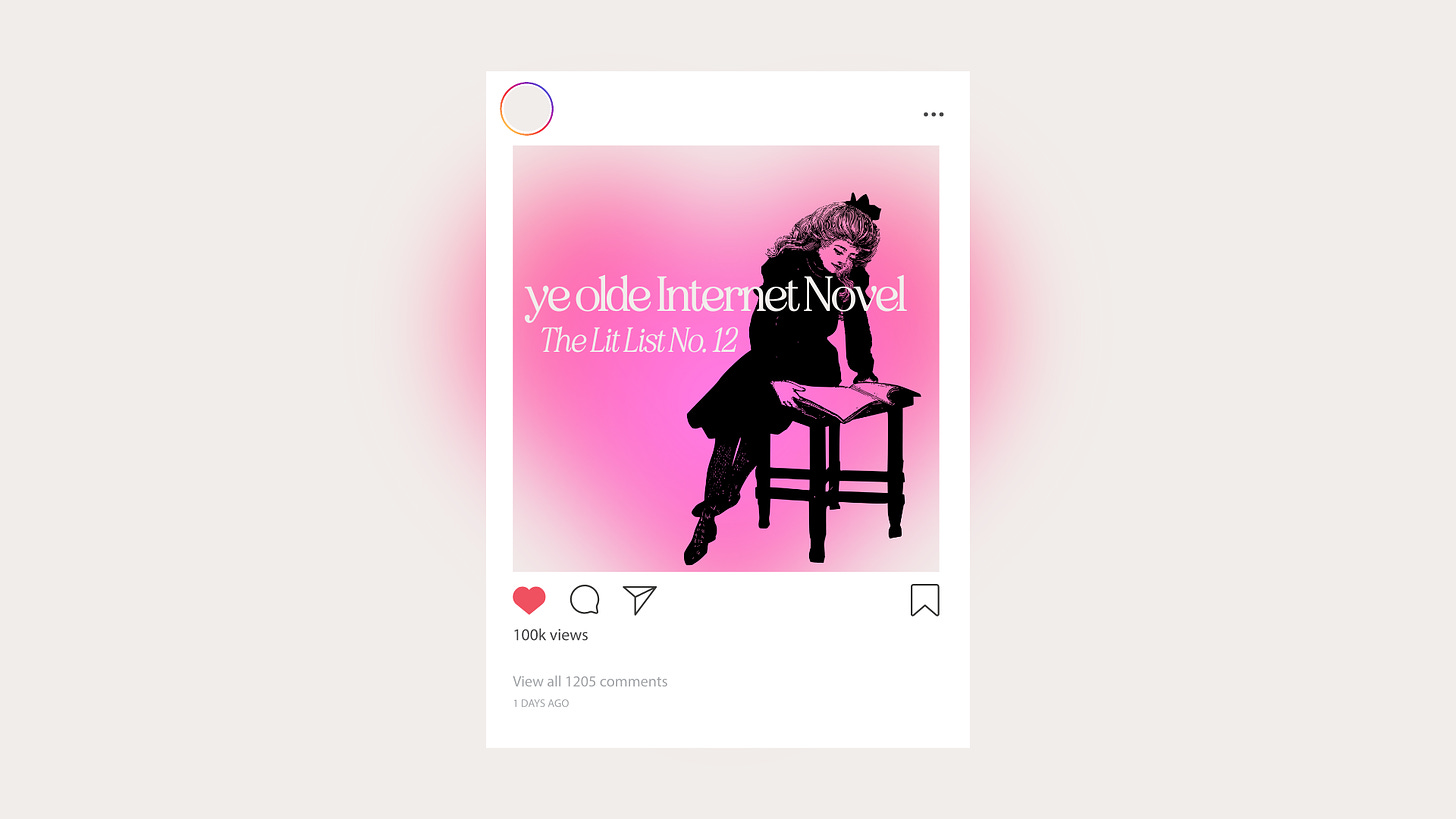
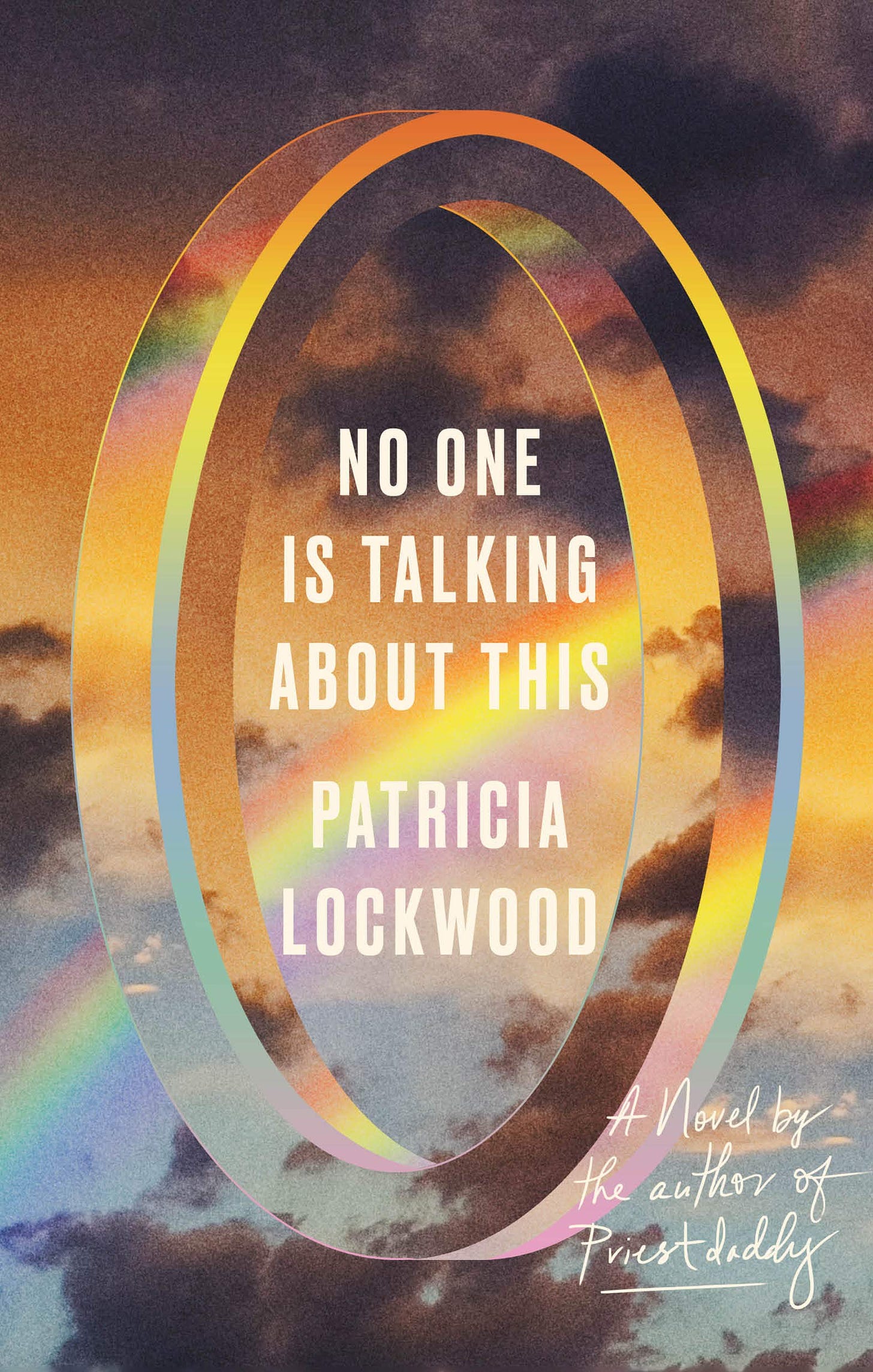
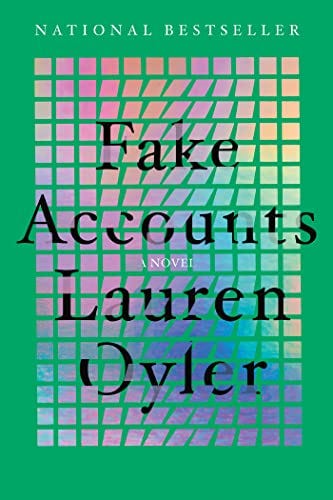
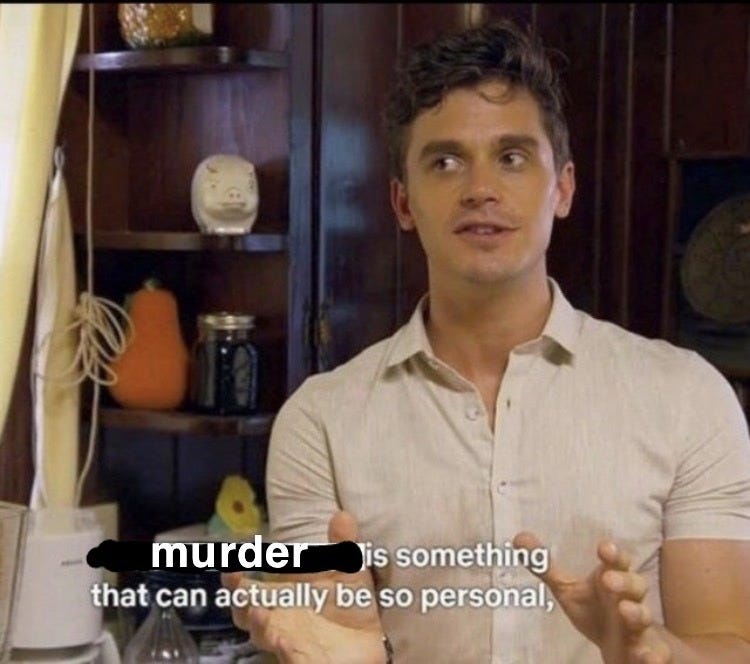
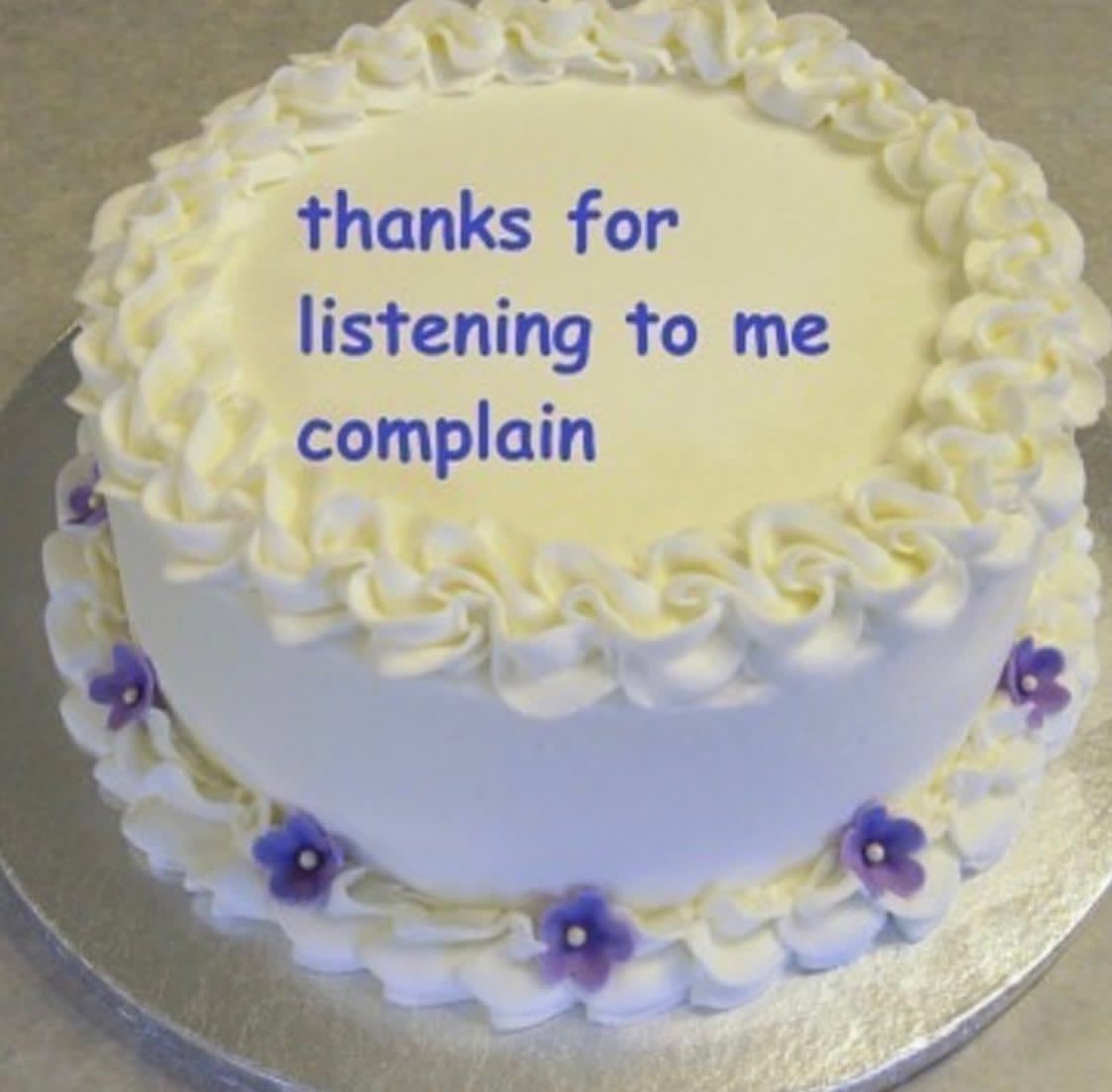
The problem with the social media novel (or fiction more generally) for me is mostly that they fool themselves into thinking a narrow slice of internet existence can stand in for the whole: namely that *most* social media users are vast, high-follower accounts whose every move is adored or picked over, prone to cancellation.
Example throwaway comments:
* The part in Beautiful World, Where Are You? where one of the characters looks up an ex on IG and finds his post has 175 likes ... a very improbable figure for a modestly popular account.
* Cynthia Nixon's worry that her racism in class (in the SATC reboot) will turn her viral.
* THE BATMAN's villainous Twitch streamer having (in hushed tones) 500 followers.
The insinuation is that the social media world is more dangerous than it is; more pliable for success; more active. But in fact the vast majority of social media users are reclining and just watching the world pass by. Few are social media protagonists.